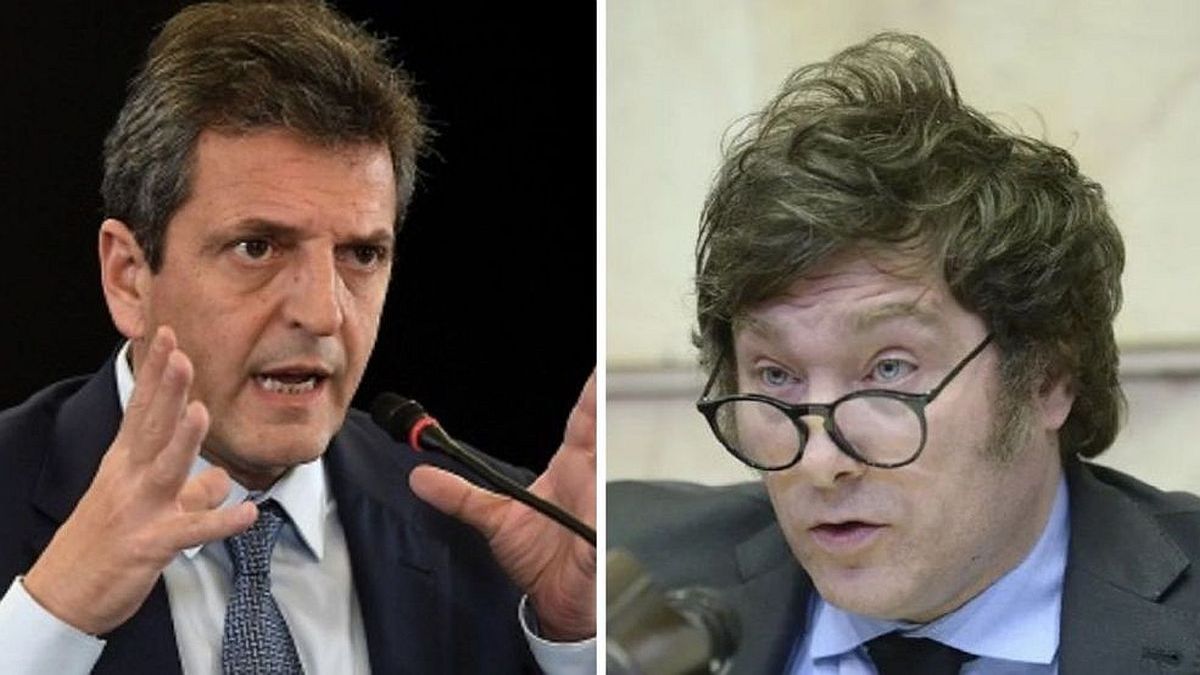After the primary elections, uncertainty rose virulently and the country once again suffered another impulsive shock, due to the exit of investors from Argentine assets and the skyrocketing of alternative dollars. The last mini crisis had a trigger and this was the imprecise and chilling future that promises Javier Miley, with an economic dollarization project to which the US has already given its thumbs up, in contrast to the IMF’s compliance with the administration of Sergio Massa. All this, in the midst of an economy that reached the STEP with great macrofinancial vulnerability, as a result of Macri’s selective default in 2019, added to the pandemic, the war in Europe, the drought and the limitations of the Government of Alberto Fernández.
The result “miley winner”totally unforeseen in the STEP, plus the fear of Patricia Bullrich With déjà vu in 2001, just six months after either eventually takes office, they sent a panicked mood through the markets. This situation plus the fear of a fortuitous disorderly transition attempting to weaken the government politically (Milei said he was ready to take office and this week Patricia Bullrich said that a state of siege should be declared), they dynamit not the BCRA-as Milei promises-but confidence, causing the collapse of the demand for domestic assets. Immediately after the result, the bitcoin dollar skyrocketed on Sunday, the sale of bonds, the demand for dollars increased, and the financial system began to lose deposits on Monday.
With the recurring hindrance-Cavallo had done it to Alfonsín-. According to Massa, the economists from Together for Change asked the IMF not to make the disbursement of US$7.5 billion and demanded that it demand tougher measures. Massa revealed this at a press conference, citing IMF technicians as a source, who branded the latter as “anti-country.” The names of the economists involved in the operation circulated quickly on the internet. Sergio Chodos accused three of Macri’s economists.
In summary, the victory of Milei and Bullrich over Larreta in the PASO, unleashed another fall in the demand for Argentine assets. The dynamics of the crisis tended to accelerate due to the precariousness inherited from the government of Mauricio Macri, who brought the IMF back to the country. Inseparable from the context of restricted and dwindling reserves, excessive financial shortages from the national government, for having completely cut credit to the country, in January 2018, during the government of Together for Changewho had also left the agreement with the IMF on the brink of the abyss.
As in other countries, in the economy there are issues of competitiveness, weakening of competition and monopoly rents, but in Argentina there are other problems. One of the main drawbacks that the country has has to do with the fractures with which society has been injured by having been exposed to recurring crises and repeated arbitrariness.
Memories: “El Rodrigazo”, “the tablet and the financial bicycle of Martínez de Hoz”, “he who bets on the dollar loses” by Sigaut, the “Plan Bonex” and “el Corralito” by Cavallo and Patricia Bullrich, the ” endless devaluations and soaring inflation” by Prat Gay, Sturzenegger, Dujovne, Caputo, “selective default” by Macri-Lacunza, etc. They have left great consequences.
Thus, in the face of any unforeseen political change, a society aggrieved in other crises, vertiginously and preventively prevents itself, reducing its exposure to Argentine risk, fleeing capital, withdrawing deposits from the banking system, fleeing the peso, etc. and, leading to a new run on the blue dollar, due to the new invocation of dollarization and the brutal adjustments of the candidates of “La Libertad Avanza” and “Juntos por el Cambio”. Known and unknown drivers of past and potential economic disasters.
On this occasion, the news that generated insecurity were: “Milei won the PASO” and “Patricia Bullrich defeated Rodríguez Larreta”, ended up causing a real quake in the financial and real variables, significantly aggravating the problems of the current administration.
Neither can it be surprising that the traumatic effects of an eventual dollarization without dollars come to affect the behavior of economic agents. Macroeconomic vulnerability adds to an uncertain future due to the resume of the winner of the PASO (Milei never managed or managed anything, in the public sector, nor in the private sector)plus the terrifying memories of his current team, key to the economic device of Menem (Roque Fernández and Carlos Rodríguez), artillerymen and financiers of an extraordinary fiscal deficit, financed by a historic indebtedness that left De la Rúa a time bomb, exploding a macroeconomic crisis and causing a financial and exchange rate debacle, which in turn made “Convertibility” implode.
THE STEPS OF MASSA
The government’s first reaction after the primaries was to confirm the disbursement of US$7.5 billion from the IMF. Now he is trying to recover votes, through a slightly expansive fiscal policy. With financial stability and the IMF disbursement program resolved, doubts about whether Alberto Fernández would make it to December 10 or not diminished. The operation and installation of Massa’s resignation was also cleared. The economic policy was modified. The minister put the recomposition of income at the top of the priorities, while agreeing to comply with the program with the IMF.
Massa announced a product price agreement, dollar and fuel freeze. The agreement was delayed in announcing it because it was tested among businessmen and trade unionists. Thus the State intends to break the inflationary inertia, coordinating expectations. The government intends to achieve not only the objective of breaking inflationary inertia, but also has a microeconomic purpose: Pre-financing of exports, measures for agriculture, loans to SMEs, subsidized rates, fixed-sum increases for public and private workers, for retirees and pensioners-also includes ANSES loans-, tax relief for monotributistas, freezing for 90 days to prepaid medicine companies, etc. It is intended to achieve some recovery of income and some reactivation of the economy.
We see that the announced measures once again have a Peronist tinge, where the key is to temporarily recompose income, maintaining the consistency of the economic policy scheme. If Massa wins, it could be the launch of a short-term plan that is coupled with another for medium- and long-term economic development. The most important thing about the announced measures is that at first sight, there would be consistency with fiscal and monetary policy, with an exchange rate that rose competitively, all of which configures a dynamically consistent scheme.
In this context, the economy could stop falling. On average, the drop in GDP in 2023 would be much less, and would leave a positive drag for the year 2024.
Director of the Hope Foundation. https://fundacionesperanza.com.ar/ Graduate Professor UBA and Masters in private universities. Master in International Economic Policy, Doctor in Political Science, author of 6 books
Source: Ambito
David William is a talented author who has made a name for himself in the world of writing. He is a professional author who writes on a wide range of topics, from general interest to opinion news. David is currently working as a writer at 24 hours worlds where he brings his unique perspective and in-depth research to his articles, making them both informative and engaging.




